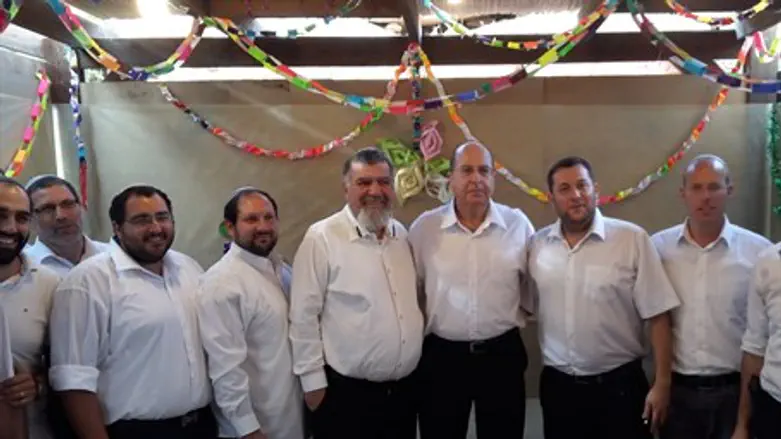
Defense Minister Moshe Ya'alon toured sukkot booths in several communities in Judea and Samaria on Sunday, where he met with regional leaders on contemporary issues of government and defense.
Ya'alon visited the communities of Har Bracha, Beit El, and Eli - where he spoke with legislative and religious leaders, residents, and members of Likud.
During the Beit El meeting, Ya'alon was confronted by the sentiments of one resident - who, like many living in the region, have become frustrated with the "second-class" status appropriated to residents' needs, especially regarding transportation.
"After 37 years of living here [in Beit El], we have grown from 10 families to over 1,000," the resident stated. "Fourth-generation immigrants to Israel grew up here."
"But through all this time, the government's position has remained the same," the resident continued. "It cannot be that, despite everything, the living conditions of residents [in Judea and Samaria] are not like other regions in Israel - especially when these 'settlements' have produced a large number of the country's best officers and soldiers."
Residents and regional leaders also raised concern over Route 60, the sole two-lane highway from Judea and Samaria to Jerusalem, which is stymied constantly by bad traffic and a is a prime target for terror attacks.
The Defense Minister responded to several of the issues by noting that some of the concerns are under the jurisdiction of Prime Minister Binyamin Netanyahu himself, not Ya'alon.
Ya'alon also stressed that he feels "connected" to Judea and Samaria, and would "like to help solve problems in the region."
Frustration and backlash
In Beit El, attendees felt the palpable absence of the head of the Beit El Yeshiva, Rabbi Zalman Melamed, who decided not to attend the meeting to which he was invited in order to protest.
Rabbi Melamed meant to send a message, "loud and clear," to both Ya'alon and Netanyahu that they are breaking an agreement formed over two years ago over the planned construction of apartments in the Ulpana neighborhood.
In 2012, the High Court for Justice authorized the destruction of five apartment buildings in the neighborhood, sparking widespread preparations for a community protest.
Netanyahu, expecting opposition, eventually decided to meet with community leaders to forge a compromise over the destruction of private property in order to prevent unrest.
To that end, the Prime Minister's entourage met several times with Rav Melamed and fellow community leaders before agreeing that the state would fund the construction of 300 apartment units to compensate for the loss - in exchange for Rav Melamed and others agreeing to allow the buildings to be built elsewhere in Beit El without complaint.
In practice, the removal and destruction of buildings was carried out quietly, as promised to Rabbi Melamed - but, to this day, the 300 housing units have still not been built. As such, Rabbi Melamed sent a message to the prime minister's office over the harm the delay causes to the public - especially since Israel is in the depths of an intense housing crisis.
A plenary council member in Beit El, Musa Cohen, told Arutz Sheva that the feeling among those present at the meeting was very uncomfortable.
"Despite all the nice talk, there has been a construction freeze here for over ten years," Cohen lamented. "Children who have been looking for a place to live near their parents during that time have not been able to find housing and left."
"Homes that have been built are being threatened with demolition, and Border Police have threatened [nearby] Givat Assaf," he continued.
Earlier this month, Housing Ministry figures revealed that the housing crisis has deepened - in no small part due to a "covert" building freeze in Jerusalem, Judea and Samaria.
The construction freeze has checked the natural growth of a region that is reportedly over 90% unpopulated. It also, together with the green light given to rampant illegal Arab construction in eastern Jerusalem, is part of what is charged as being an attempt to establish facts on the ground to divide Jerusalem and establish the groundwork for a Palestinian state.